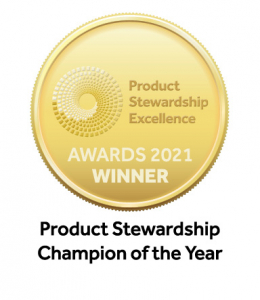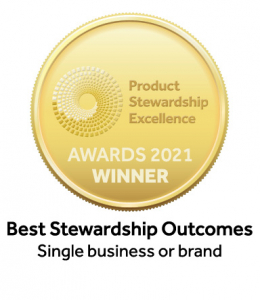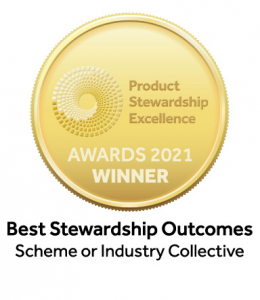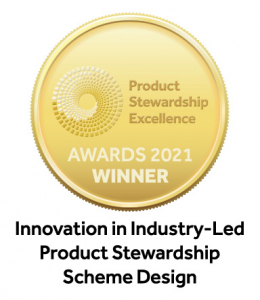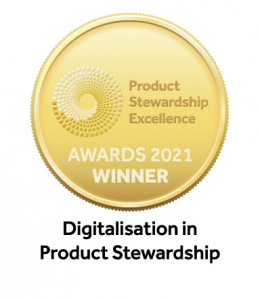Bata Shoe Company of Australia won the Award for Best Stewardship Outcomes (Single Business or Brand) at the inaugural Product Stewardship Centre of Excellence (PSCoE) Awards.
Bata’s PVC Recycle program was set up to reduce the amount of PVC gumboots ending up in landfill.
National Sales Manager Leigh Ramsden said used boots were re-processed into raw materials to create new Bata PVC gumboots consisting of 50% recycled content.
“Unfortunately, there is a lot of waste in the industry, and we wanted to find out how we could fix that,” Mr Ramsden said.
“Most people in the food industry only wear them for six weeks and then they go to the bin because they wear out. Food processing plants and abattoirs have a fine grit on the floor to prevent slips, trips and falls but that just wears through the PVC at the bottom. Once the main grip or sole wears off, they have to be replaced for safety purposes.”
Formerly synonymous with leather lace-ups for school children, Bata is now a major player in gumboots, selling more than 550,000 pairs in Australia this year alone.
“There has been a whole transition from the school shoe business which we were predominately known for into industrial safety in gumboots,” Mr Ramsden said.
“We still do school shoes but not to the extent that we did 10-15 years ago.”
Bata is passionate about adding to the circular economy.
“We need to take as much waste out of landfill and try to reuse where possible,” Mr Ramsden said.
“We live in one of the greatest places in the world with so much natual beauty, and we don’t want to be responsible for destroying that. So how can we play our part?
“Our main objective is to have zero used or worn PVC gumboots being disposed into landfill and to help our customers responsibly dispose of their used boots.
“We are working to set up easy-to-use recycle disposal bins nationwide in collaboration with our current distributors.”
Bata’s noble endeavour is not without challenge, which makes the award win all the more rewarding.
“Our biggest stumbling block to get the program up and really running is the cost,” Mr Ramsden said.
“At the moment, we’re absorbing that cost. We’re taking a loss as a business to do the right thing and try to get momentum going.
“We won’t be competitive if we push up prices when you’ve got imported product coming in at a lower cost. So, if we can sort out the freight of returning the used gumboots, we’re good to go.
“Australia is massive so getting gumboots back from WA, for example, is a huge cost.”
Sharing costs with likeminded businesses is a solution Bata is exploring to make the program viable.
“If we work with more manufacturers or other industry partners bringing gumboots or things like PPE and hard hats back and we can share that cost across the board, it reduces the cost.
“Maybe we have centralised points in each state that we bring stuff back to or maybe we work together and share the cost across the board.
“It’s the only stumbling block, not just for us, but for everyone. Together is better.”
The PSCoE Award is already helping to create awareness of the PVC Recycle program.
“This award has brought some amazing recognition to the program, which is fantastic,” Mr Ramsden said.
“We’ve had people reach out to us asking how they could get involved.
“Slowly but surely, more and more people are coming on board and the award has sped this process up.
“However, we don’t want this to be just about ourselves. It would be ideal to have more companies reach out and say: ‘Congratulations. How can we do something like that? Can we partner with you?’ or ‘We’ve got PVC products; can you recycle them?’”
Rachael Wilkinson, a Senior Adviser at the Centre of Excellence, said product stewardship schemes across Australia face similar issues.
“We need to look at our freight logistics options for moving product around with the explicit purpose of recycling it,” she said.
“It’s about scale. That’s part of the reason the judges saw the potential for this project — to scale, which is what we need for anything to be successful, particularly in Australia, because of our geography and the costs associated with moving things around.
“It’s not easy. It would be great to see some thought given to funding individual businesses who are doing projects such as Bata’s.”
It’s wonderful to see businesses winning awards for being ahead of the curve and proactive about doing something,” she added.
“The sky is the limit with collaboration but in order to get that collective, often you do need that one business who pioneers something and says: ‘Look guys, it can be done. Join us to make something happen.’
“That’s why these awards are so valuable. They spotlight those businesses who are putting themselves out there and coming up with something innovative and being an example to the rest of the industry and an inspiration to other industries who might think: ‘The humble gumboot . . . maybe we’ve got a product that we could incorporate recycled inputs into.’”
Product stewardship acknowledges that those involved in designing, manufacturing and selling products have a responsibility to ensure those products or materials are managed in a way that reduces their environmental and human health impacts, throughout the life cycle and across the supply chain.
It aims to drive environmentally beneficial outcomes through good design and clean manufacturing, including the use of components and materials that are easier to recover, reuse and recycle.
The Product Stewardship Excellence awards recognise excellence and action in product stewardship and seek to raise the profile of stewardship in business, Government and NGOs.
The Product Stewardship Centre of Excellence thanks our awards sponsor Kmart for their support and on-going commitment to product stewardship.
Written for the Product Stewardship Centre of Excellence by Wendy Larter, Ai Group.



